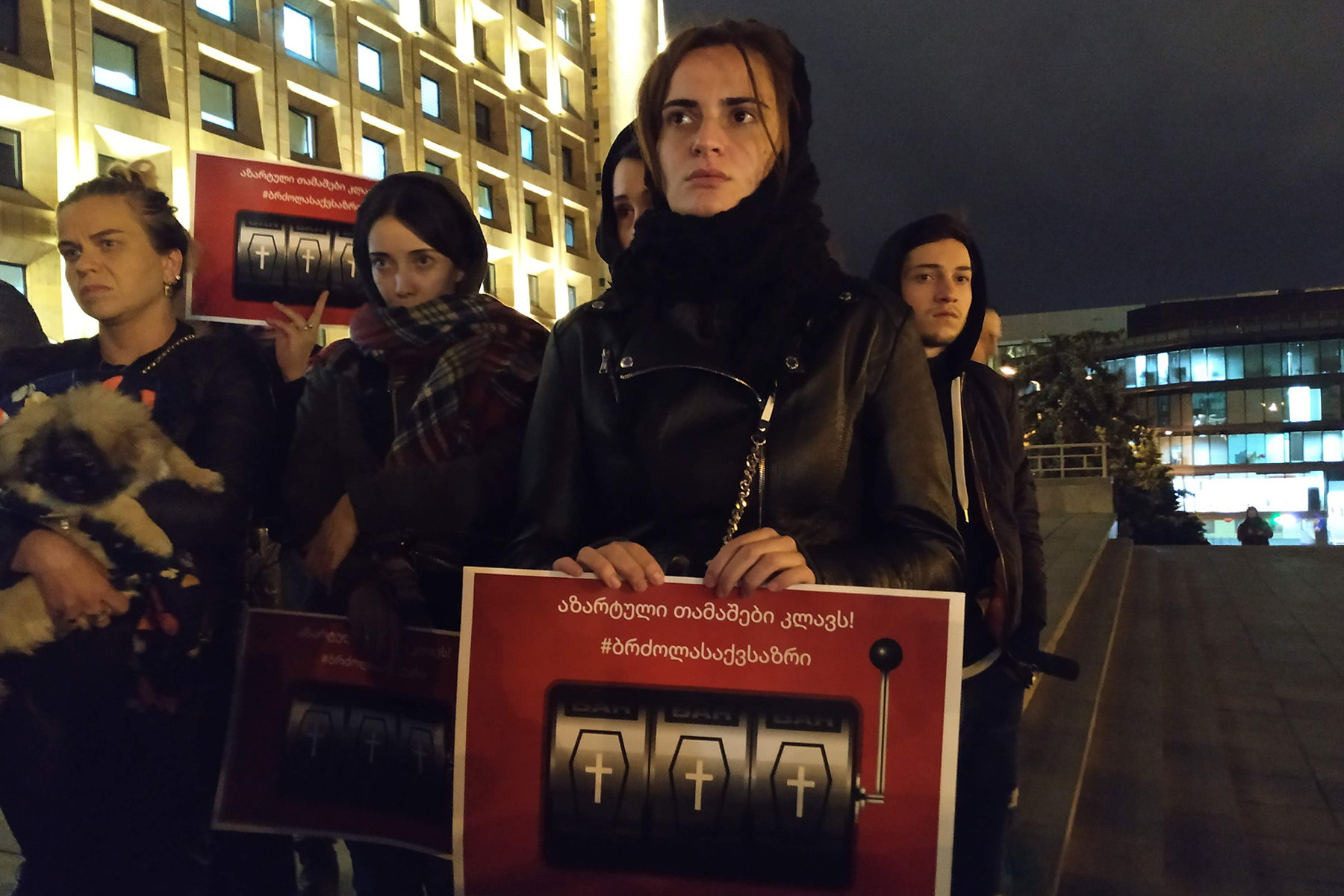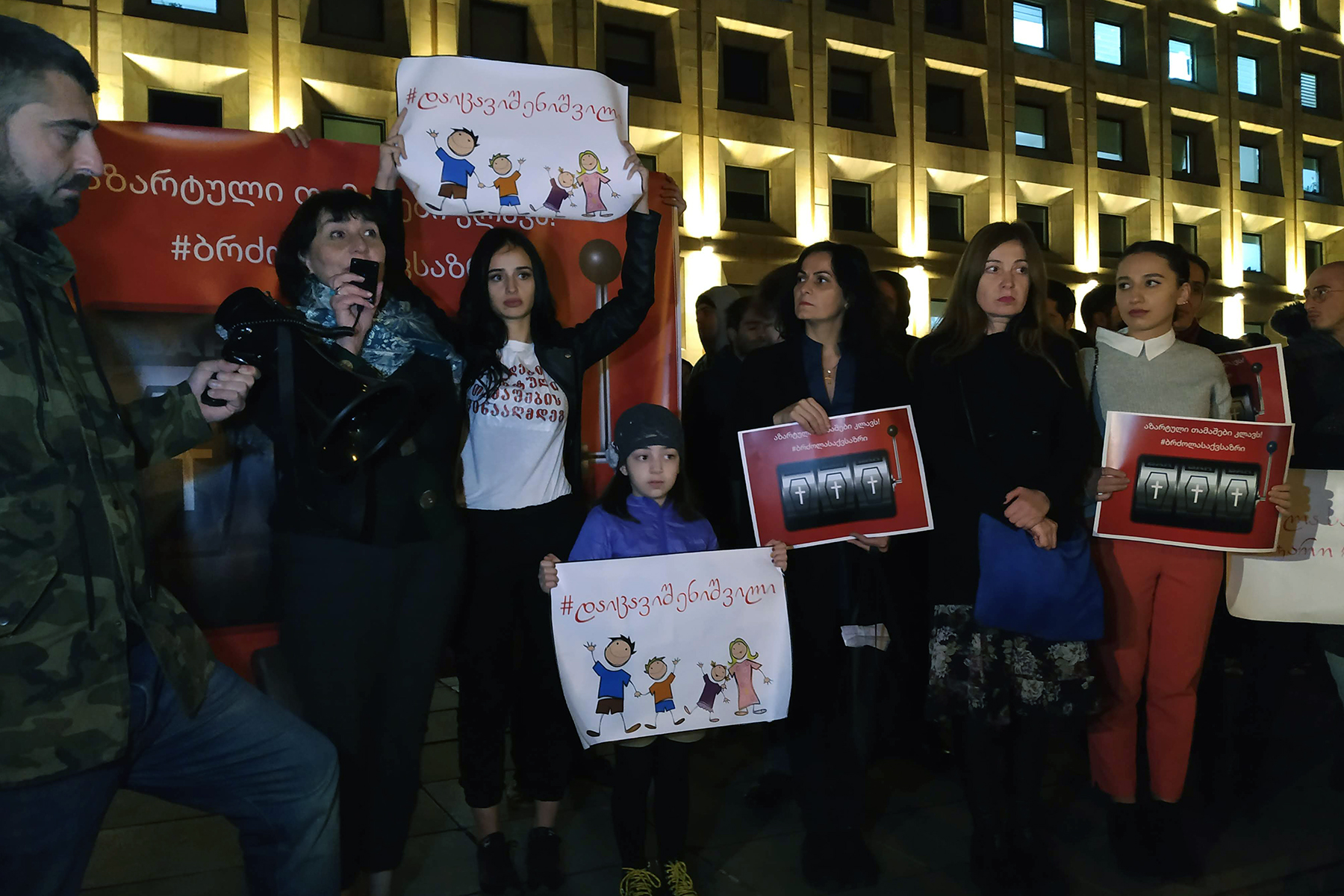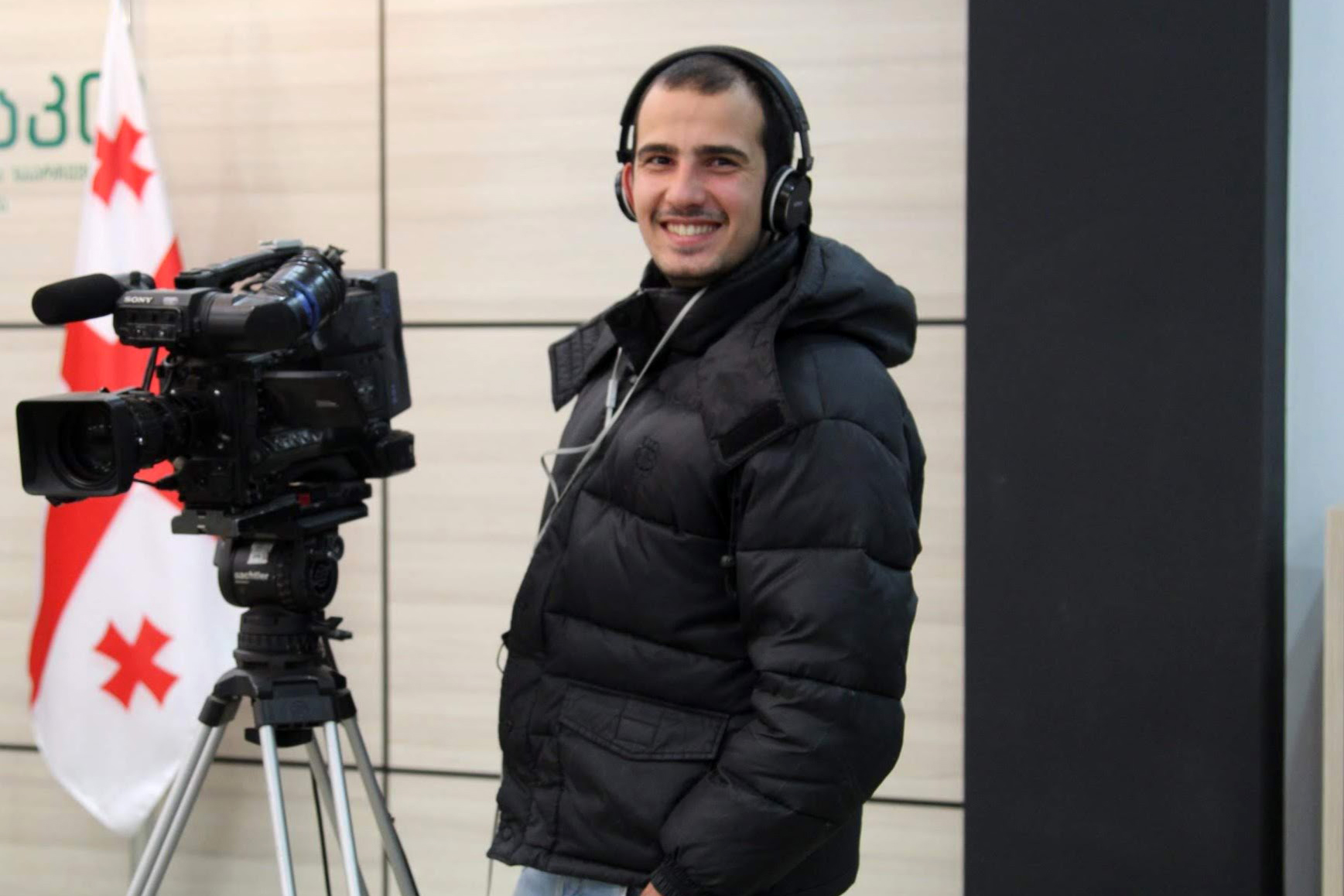

Around a hundred people gathered outside the Georgian Government Chancellery building on Friday to demand the government take action against gambling. Their immediate demands included a ban on gambling advertisements.
The demonstration kicked off with a speech from campaigner Anna Dolidze, a non-judge member of Georgia’s judiciary oversight agency, the High Council of Justice.
Dolidze read out a statement with four demands, vowing to gather 10,000 signatures for their appeal to upload to the government’s petitions portal.
The central message of the petition was that the government needed to protect underage people from being recruited into gambling.
The text said that the problems caused by the industry included ‘suicides, poverty, a loss of real and personal property, money laundering, and domestic violence’.
‘We demand that the Georgian government outline a plan for fast economic growth that does not rely on gambling businesses and income, which comes at the expanse of our youth’s health and future’, the statement read.
Dolidze listed several specific demands: to define ‘tourist’ zones for gambling establishments, to ban those under 25 from casinos and online casinos, to ‘immediately finance’ programmes, including a hotline, to help addicts, and to ban all online and offline advertisements, including on TV and banners in public spaces.
The campaign also suggested making 1 November ‘national day against the gambling problem’.
Dolidze, a lawyer and frequent government critic, recently endorsed an anti-gambling campaign led by several groups, including Mothers Against Gambling.
‘What happened today was a consolidation of all forces and groups that have been working on the gambling addiction problem in Georgia’, Guga Beselia, one of the organisers of the protest and the Director of the Georgian Gambling Research and Prevention Centre (GRAPC) told OC Media.
‘A 13-year-old teenager should not be able to gamble, and today, it’s now already a public demand to solve this problem.’
According to a study released in May from GRAPC, of 500 school pupils aged between 15–18 they questioned, 59% said they gambled to various degrees, predominantly with online table games and slot machines.
Beselia noted in a press conference in April that as an experiment, he had managed to register his 5-year-old son on one Georgian online gambling portal using his birth certificate.
The law currently permits only those aged 21 or above to enter gambling venues but allows those aged 18 or above to access slot machine establishments.
Tamar Japaridze, the Head of Mothers Against Gambling, claimed that since July, 17 young people with gambling addictions have taken their own lives, and that 7 also attempted suicide. She said that their ages ranged from 14–31.
There are no official figures regarding this matter.
‘For Sandro’
‘People are asking for help but we cannot provide it because we are only civil society. That’s why I’m calling on the government — the Health Ministry — to recognise problem gambling as a dangerous disease, as the World Health Organisation (WHO) did’, Japaridze said in her speech in front of the government building on 1 November.

The WHO first added ‘pathological gambling’, later to be renamed a ‘gambling disorder’, to their Diagnostic and Statistical Manual of Mental Disorders in 1980.
At the 1 November rally, Dolidze welcomed a decision by the 1st Channel of the Georgian Public Broadcaster (GPB), the National Parliamentary Library of Georgia, and publishing holding Palitra Media not advertise gaming products and services. Palitra said they had boycotted them as early as in 2016.
Dolidze vowed to hold rallies against those who would not.
Protesters included relatives and friends of Sandro Beradze, a 29-year-old camera operator at GPB who was found dead on 29 October in Tskhvarichamia Forest, around 35 kilometres from Tbilisi.

His family, who tried to discover his whereabouts for four days, said he had struggled with gambling addiction.
Demonstrators opened the protest with a minute of silence to commemorate Beradze.
The day after Beradze’s body was discovered, his employers, the GPB, became the first to announce a boycott against the gambling industry — starting from January.
Giorgi Kekelidze, Director of the National Library announced their decision soon after.
‘Sandro’s story should be a warning… There are frequent events at the National Library where you can see ads for gambling games too. From now on, we decided not to display such banners. It’s a drop in the ocean but this drop could save someone thirsty from death’, Kekelidze wrote on Facebook on 31 October.
Levan Gogichaishvili, an independent MP who left the parliamentary majority several months ago, welcomed the boycott. He and several other independent MPs, including Levan Koberidze and Gedevan Popkhadze, joined the 1 November rally.
Zviad Tomaradze, the head of the far-right Georgian Demographic Society XXI, also joined the demonstration on Friday.
Regulations against ‘death industry’
On 22 October, Levan Gogichaishvili and six other MPs submitted a draft law against gambling advertisements. The law would have levelled fines of ₾10,000 ($3,400) against both gambling companies and companies that provide advertisements for any ads larger than 10 square metres.
Gogichaishvili was unsuccessful in his first attempt to pass the law in April but vowed this month to try again, urging the public to support the cause.
‘This industry, which I call a “death industry”, benefits from the status quo. It is also a nice way for the ruling elite to launder money and control the flow of finances’, Gogichaishvili told journalists at the 1 November rally.
The topic of gambling was also taken up by Jondi Baghaturia, head of non-parliamentary conservative opposition party Kartuli Dasi. On 3 November he organised a rally in front of the GPB in support of their decision to ban gambling advertisements.
On 31 October, the day before Friday’s rally, Shalva Natelashvili, Chair of the Labour Party of Georgia, called gambling one of the top two problems faced by Georgian youth, ‘together with the [Russian] occupation’.
Natelashvili vowed that he would solve the problem if his party came to power.
The Labour Party has previously come out against the gambling industry.
In 2018, Georgia’s gambling industry turned over almost ₾14 billion ($4.7 billion), 16% of the whole private sector, making it larger than the construction and other key sectors.
According to Georgian outlet Business Press News, citing official figures, of the top 10 companies with the highest revenues in 2018, five were gambling companies.
On 1 November, Vakhtang Shakarashvili, an independent councillor on the Tbilisi City Council (Sakrebulo) accused the City Hall of using recent taxi reforms to make taxis in the Georgian capital carry advertisements for gaming companies.
After taxi owners were forced to paint their cars white, Georgian ad company Alma offered to repaint drivers’ cars free of charge in exchange for placing advertisements, including for gaming companies, on their cars. The City Hall has denied the allegations.








